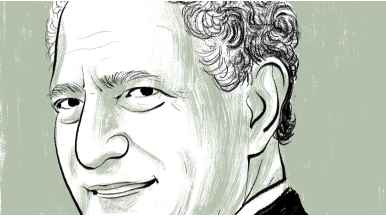The Sidewalk Labs deal is unconstitutional

Once upon a time, some unelected folks at Waterfront Toronto blurted out, “Hey Google, what’s the best way to develop Toronto’s waterfront?” Google Assistant ought to have replied, “I don’t know that yet” or “I can’t help you with that right now.” Instead, Google’s sibling, Sidewalk Labs, a precocious urban affairs neophyte, replied with a 1,524-page plan called “Toronto Tomorrow.”
If you asked Walt Disney to place his vision for EPCOT in Toronto, it would look something like Sidewalk Labs. The data surveillance devices are stylish and cute. There are plenty of snappy acronyms like Super-PON—“Super Passive Optical Network”—and the Innovative Design and Economic Acceleration (IDEA) District. Sidewalk has proposed an $80-million timber factory that will supply enough construction material for an entire neighbourhood. Buildings will have “raincoats” that shield us in harsh weather, and “fanshells” that cover outdoor spaces. Proposed public spaces with names like Parliament Plaza, Parliament Slip and Silo Park will have curbless street design, wider sidewalks, wayfinding beacons, heated pavements and accessible ride-hail vehicles. What could possibly go wrong?
The problem with Sidewalk Labs’ plan boils down to a constitutional design flaw between how Silicon Valley companies function and how our democracy is meant to work. It’s the legal equivalent of trying to run the latest version of Microsoft Word on a 1980s Mac. The incompatibilities are innumerable. Take Canada’s system of responsible government, with all its careful accountability mechanisms. When Epcor comes to a town to propose a new solar farm, for example, the process isn’t run by Epcor, for Epcor. Our constitution requires elected legislators to say yea or nay to proposals after they go to the relevant public committees. All information being considered by legislature must be publicly available. Then politicians are held to account at the next election.
Sidewalk, on the other hand, subscribes to the Silicon Valley PR strategy. It considers governments stakeholders, not democratic institutions. It discloses information through cues, leaks and jargon, all decoded by a fully compliant and trusting industry media. Sidewalk seems to believe it can skip lawful due process and imagines urban affairs as just another unregulated market for them to occupy. It’s not. Ask Toronto real estate developers if PR is enough to get the relevant legal approvals and they’ll laugh at you.
While Sidewalk Labs has been performing its razzle-dazzle, the only constitutional actors have been sidelined. The decision-makers on Quayside are board members of Waterfront Toronto. But Waterfront Toronto is not a government agency, and expressly says so in its enabling statute. It was created by a provincial legislature years ago to build certain things on the shoreline, like Sugar Beach, which transformed a parking lot into a pink-umbrella beach. But Waterfront Toronto has no legal authority to mine for gold in Lake Ontario, or build a nuclear plant in Scarborough. Save one city councillor, all board members are unelected citizens appointed by governments.
No federal or provincial legislature, nor municipal council, gets to approve or reject Sidewalk Labs’ plan. No government department with infrastructure experience is in charge. Nor did they delegate to Waterfront Toronto, by law, the power to make decisions of this magnitude, affecting the Canadian Charter of Rights and Freedoms.
So what? Didn’t we all lose our privacy long ago to security cameras, location tracking and Internet cookies? Maybe, but our past negligence needs correction, not greater disregard. Canada is far behind the latest data privacy law evolution,, embodied in legislation like the EU General Data Protection Regulation and the California’s Consumer Project Act. Politicians in those jurisdictions made accountable decisions through constitutional processes.
Toronto, therefore, represents a great opportunity for Silicon Valley. Our lack of effective privacy regulation makes us an attractive candidate to set up their urban affairs laboratory—and we’re the lab rats. Canada’s federal privacy commissioner said last year that our privacy legislation is “sadly falling behind what is the norm in other countries.” The recent “Digital Charter,” released by federal Liberals, ostensibly as an election promise, sets out some norms but lacks any force of law, any timetable for legislation, and anything concrete on enforcement.
Sidewalk Labs can dominate the process through their budgetary might, outspending exponentially what little Waterfront Toronto might do by way of oversight. They can disclose or withhold information as they wish, and do with their data sensors whatever they wish. With few laws slowing them down, their only limit is how much they’re willing to invest.
Privacy is not something for which restitution is possible. Once you lose a bit of it, you can’t get it back. In the case of Sidewalk Labs, a company that loves its idea more than the community it serves is trying to decide our future. It has to be the other way around: the community decides what it wants for itself, then invites locals and outsiders to help build that vision.
Our elected leaders should be figuring out the why, when and how of public data collection before they hand over the keys to Sidewalk Labs. If the Quayside proposal crashes due to incompatible applications—namely, our constitution—this is no bug requiring a software patch. Instead, we can reset the project, let constitutional players do their job, stop letting technology companies control everything, and start letting Torontonians exert control over their own city.
This story originally appeared in the September 2019 issue of Toronto Life magazine. To subscribe, for just $29.95 a year, click here.























